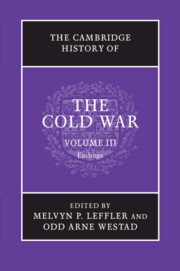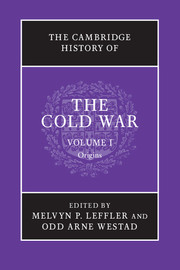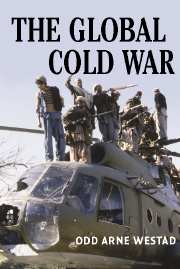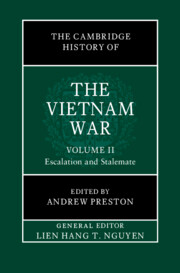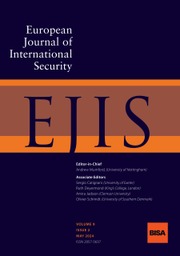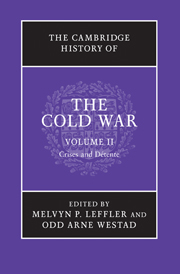The Cambridge History of the Cold War
Volume III of The Cambridge History of the Cold War examines the evolution of the conflict from the Helsinki Conference of 1975 until the Soviet collapse in 1991. A team of leading scholars analyzes the economic, social, cultural, religious, technological and geopolitical factors that ended the Cold War and discusses the personalities and policies of key leaders such as Brezhnev, Reagan, Gorbachev, Thatcher, Kohl and Deng Xiaoping. The authors show how events throughout the world shaped the evolution of Soviet-American relations and they explore the legacies of the superpower confrontation in a comparative and transnational perspective. Individual chapters examine how the Cold War affected and was affected by environmental issues, economic trends, patterns of consumption, human rights and non-governmental organizations. The volume represents the new international history at its best, emphasizing broad social, economic, demographic and strategic developments while keeping politics and human agency in focus.
- Examines how the end of the Cold War affected and was affected by human rights, public health, capitalism, science and technology, and the global economy
- Sheds new light on the personalities and policies of leaders around the world such as Carter, Reagan, Brezhnev, Gorbachev, De Gaulle, Thatcher, Kohl and Deng Xiaoping
- Analyses events from the perspectives of a range of countries and regions including the US, Japan, China, Central America, Southern Africa, Germany, the Soviet Union, Iran and Afghanistan
Reviews & endorsements
Review of the set: 'There has never been a Cold War history like it; everything about it is monumental … In total, the volumes represent a successful interconnected attempt at describing the Cold War in full.' Jost Dülffer, H-Soz-u-Kult
Review of the set: 'The Cambridge History of the Cold War (CHCW) marks a coming of age for Cold War studies. This multi-volume compilation provides a synthesis of the 'New Cold War History'. It is a signal moment in the evolution of the field.' Mike Sewell, H-Diplo
Review of the set: '… if [I] could recommend just three books to a reader with no prior knowledge of the Cold War - the average undergraduate, say - it would likely be this series. The breadth and depth of coverage, in disciplinary and geographical terms, is unparalleled.' David Milne, H-Diplo
'Like its two predecessors, the third instalment of The Cambridge History of the Cold War (CHCW), is scholar's and instructor's dream for it provides well organized chapters covering major issues in the research of the late Cold War period, all delivered by leading historians in the field.' Dina Fainburg, H-Diplo Roundtable Reviews (h-net.org/~diplo/roundtables)
'… a superb collection …' Robert English, H-Diplo Roundtable Reviews (h-net.org/~diplo/roundtables)
Product details
January 2012Paperback
9781107602311
712 pages
227 × 152 × 31 mm
1.1kg
42 b/w illus. 3 maps 3 tables
Available
Table of Contents
- 1. The Cold War and the intellectual history of the late twentieth century Jan-Werner Müller
- 2. The world economy and the Cold War, 1970–1990 Giovanni Arrighi
- 3. The rise and fall of Eurocommunism Silvio Pons
- 4. The Cold War and Jimmy Carter Nancy Mitchell
- 5. Soviet foreign policy from détente to Gorbachev, 1975–1985 Vladislav M. Zubok
- 6. Islamism, the Iranian revolution, and the Soviet invasion of Afghanistan Amin Saikal
- 7. The collapse of superpower détente, 1975–1980 Olav Njølstad
- 8. Japan and the Cold War, 1960–1991 Michael Schaller
- 9. China and the Cold War after Mao Chen Jian
- 10. The Cold War in Central America, 1975–1991 John H. Coatsworth
- 11. The Cold War and Southern Africa, 1976–1990 Chris Saunders and Sue Onslow
- 12. The Gorbachev revolution and the end of the Cold War Archie Brown
- 13. US foreign policy under Reagan and Bush Beth A. Fischer
- 14. Western Europe and the end of the Cold War, 1979–1989 John W. Young
- 15. The East European revolutions of 1989 Jacques Lévesque
- 16. The unification of Germany, 1985–1991 Helga Haftendorn
- 17. The collapse of the Soviet Union, 1990–1991 Alex Pravda
- 18. Science, technology, and the Cold War David Reynolds
- 19. Transnational organizations and the Cold War Matthew Evangelista
- 20. The biosphere and the Cold War J. R. McNeill
- 21. The Cold War and human rights Rosemary Foot
- 22. The Cold War in the longue durée: global migration, public health, and population control Matthew Connelly
- 23. Consumer capitalism and the end of the Cold War Emily S. Rosenberg
- 24. An 'incredibly swift transition': reflections on the end of the Cold War Adam Roberts
- 25. The restructuring of the international system after the Cold War G. John Ikenberry.

